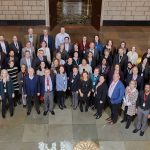The move towards open research in the form of open access academic papers has been a slow and steady but ultimately successful move in the research community over the last 30 years. More recently, research funders and academic publishers have helped drive the acceleration in open academic data becoming the norm in research dissemination. While many funders globally have had mandates for nearly a decade, the publication of the findable, accessible, interoperable and reusable (FAIR) data principles and the upcoming National Institutes of Health open data policy, described by Nature as seismic, has left researchers questioning why they should be making data available and – more concerningly – how?
This was most recently brought to the forefront of people’s minds globally in the search for COVID-19 vaccines, which highlighted several things:
- the need for fewer barriers when it comes to researchers building on top of the research of others
- a desire for plain language summaries when it comes to the general public attempting to interpret the research and drug information
- better metadata describing open data so that machine learning and artificial intelligence algorithms can search for patterns in a more efficient way than humans can.
This is where biopharmaceutical companies have been leading in improving the way academic research can be disseminated. At Figshare, we have been working with biopharmaceutical organizations to provide policy-compliant infrastructure to support their researchers in publishing their content in a number of different ways, grouping materials (plain language summaries, conference proceedings, open access materials etc.) as appropriate in ways the traditional scholarly communication model previously did not allow.
In our recent conversation, Pfizer, who use Figshare to publish plain language summaries, supplemental data and green open access manuscripts, highlighted how important it is for them to have a platform for publishing these resources openly to help drive impact for the community. “The idea was to create a centralized location for sharing content related to Pfizer publications in a manner that is discoverable and freely accessible to anyone,” said Angela Sykes, Content and Education Director at Pfizer.
Figshare provides a way for biotechnology and biopharmaceutical organizations to further increase their value to patients, healthcare professionals and the wider society by publishing research in an open, discoverable manner. All public items on Figshare receive a digital object identifier that allows the platform to measure the attention, reach and potential impact of published content, be it data underlying a publication or a conference poster.
As we move into a new era of scientists and artificial intelligence working together to move research forward further and faster, we are seeing a massive gap in the ability to organize and curate open research outputs. Individual labs often have their own file-naming structures or are yet to truly understand why their data needs to be FAIR for humans and machines. Biotechnology and biopharmaceutical companies needed to work at a much larger scale in terms of researcher collaboration for many years. As such, good practice around descriptive metadata using well-defined ontologies and standards is well established.
In order to truly make research more efficient, to discover cures and develop drugs faster, all researchers need to be working with the mindset that all of their outputs need to be interpretable independently by others. The academic world needs to learn from established best practice within corporate research, and it seems that through collaborations like Open Pharma there is more than a willingness for conversation and knowledge sharing.
Mark Hahnel is the CEO and founder of Figshare, a repository platform that provides research data infrastructure for institutions, publishers and funders globally.
Figshare kindly hosts Open Pharma research free of charge.






